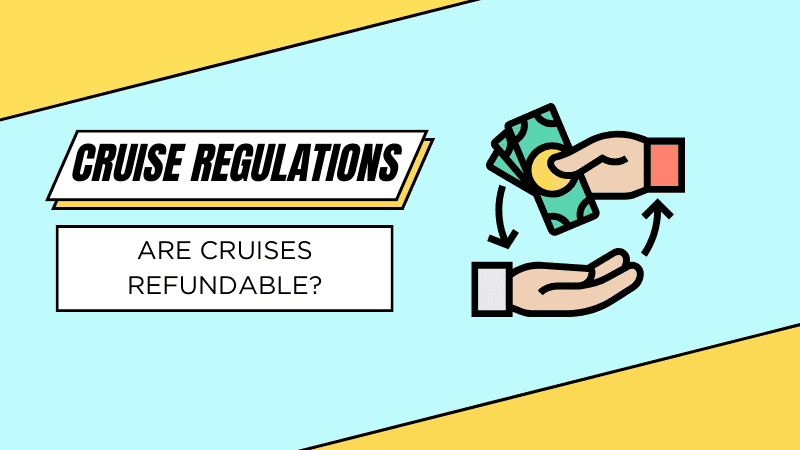When you’re about to book your dream cruise, it starts with a decision on the deposit – and not all deposits are the same. You’ll encounter two main types: refundable and nonrefundable. While the refundable option seems like a safe bet, the nonrefundable deposit might pleasantly surprise you.
Many cruise lines, in a wave of flexibility, allow these ‘nonrefundable’ deposits to morph into a future cruise credit for your next cruise. So, should you go for a refundable one, or ride the adventurous tides with a nonrefundable one?
Let’s look at the facts to help you decide what your course of action should be while booking a cruise.
Are Cruises Refundable?
No, cruises aren’t typically refundable, but it varies from cruise line to cruise line. There was a time when cruise deposits were easily refundable if canceled before the final payment was due. However, the tide has turned, and most cruise lines are now steering towards nonrefundable deposit options. This is an important consideration for pregnant travelers, as plans may need to change unexpectedly due to health reasons.
It’s not just about keeping your money anchored; these nonrefundable deposits often come with a treasure chest of extras. Think of it as the cruise line’s way of saying, “Thanks for committing!” You might snag additional savings, bonus perks, or even some services on the house.
But here’s a twist: some lines reserve these nonrefundable deposits for the high-end suites or those elusive ‘guarantee’ rooms.
Even with refundable deposits, there’s a time frame to watch. For most lines, you’re in safe waters if you cancel before your final payment date. Miss that, and you might see your deposit sail away, or even part of your cruise fare, depending on how close to the sail date you decide to request a refund.
Each cruise line has its own set of rules, and it may also depend on the destinations of the cruise. So, before you set sail on the booking process, especially for those tempting promotional fares, it’s wise to have a good look at the fine print or have a chat with your travel advisor. This is particularly important for travelers planning to bring their dogs on a cruise, as pet-friendly accommodations and policies can vary greatly between cruise lines.
While you might not always get a refund in the traditional sense, many cruise lines offer future cruise credits. It’s their way of saying, “We hope to see you on board soon!”.
Are Refundable Cruise Deposits the Right Choice?
If flexibility is your north star, then refundable cruise deposits might just be your perfect travel companion. Picture this: you’ve booked your cruise, but uh-oh, something changes. This could be especially relevant if there’s a concern about the availability of medical facilities or doctors on board, which is a key consideration for many travelers.
With a refundable deposit, you have the freedom to cancel or switch your cruise and get your money back to the original form of payment, provided you do so before the final payment date.
But that’s not all – there’s more treasure to be found with these types of deposits. They often come with the perk of price adjustments. So, if you’re watching the fares like a hawk and spot a price drop, you can snag that deal before making the final payment.
Fancy a change in scenery? You can often switch to a different sailing date or ship without any penalty, keeping your options open.
Now, what if you’re eyeing those lower fares often associated with nonrefundable deposits? Good news! Most of the time, you can switch from a refundable to a nonrefundable deposit to capitalize on these savings.
However, every choice has its trade-offs. The catch with refundable deposits is they’re often not the cheapest ticket to paradise. You might pay a bit more upfront compared to their nonrefundable counterparts. It’s a balance between cost and flexibility.
There is no right or wrong choice, it’s about weighing what matters most to you. Is it the peace of mind that comes with flexibility, or is saving a few dollars more your style? That’s the question to ponder as check out some bookings for grand voyages.
Why Should I Pick A Nonrefundable Cruise Deposit?
Opting for a nonrefundable deposit is like choosing the express lane to some exciting cruise benefits, especially if you’re pretty certain your travel plans are set in stone. Let’s set sail through the reasons why a nonrefundable deposit might be your ticket to a more rewarding cruise experience.
First and foremost, the lure of significant cruise fare discounts is hard to resist. We’re talking about saving potentially hundreds of dollars per person – that’s no drop in the ocean!
These savings can add a lot more wiggle room to your cruise budget, maybe even upgrading your stateroom or spending more on extra shore excursions.
But wait, there’s more! Nonrefundable deposits often sail hand-in-hand with tempting reduced deposit promotions and offers. Imagine not only getting a reduced fare but also reeling in extra goodies like onboard credit and other value-packed perks.
It’s like hitting a jackpot, especially if you’re the kind of cruiser who’s confident about not needing to cancel.
Take, for example, programs like Carnival’s Early Saver program. They offer what’s known as price protection. Find a better rate for your cabin category and sailing. Boom – you could be looking at onboard credit or even a free cabin upgrade to make up the difference. It’s like having a safety net, ensuring you always get the best deal.
However, it’s not all smooth sailing. If you choose a nonrefundable deposit and later find you need to cancel or change plans, your deposit might wave goodbye.
And if you’re thinking about changing your ship or sail date, be prepared for potential change fees – a small price for the flexibility, but a cost nonetheless.
It’s also worth noting that once you’ve chosen the nonrefundable path, you can’t usually jump ship to a refundable option. But, there’s a silver lining: many cruise lines, in the event of cancellation, offer the deposit back as a future cruise credit (minus any cancellation fee) instead of a cash refund.
This can be a great consolation prize, giving you a chance to rebook another cruise adventure at a later date.
Some Popular Cruise Line Cancellation Policies
Going on a cruise involves not just excitement but also understanding the fine print, especially when it comes to cancellation policies. Covering every cruise line’s policy in this short blog is like trying to explore the entire world in a day.
Let’s look at some of the popular cruise lines and their cancellation terms:
- American Cruise Lines: Cancellation requests must be in writing. Charges vary depending on the timeline before departure, with a $250 per passenger fee applicable in most cases, which can be used as a discount for future cruises within a year.
- American Queen Voyages: They implement a scale of fees, starting with a $100 administrative fee up to 91 days before departure, escalating to 100% of the gross fare for cancellations 30 days or less before departure.
- Alaskan Dream Cruises: Their policy includes a $250 per person fee for cancellations 90 or more days prior, increasing to the full fare for cancellations 30 days or less before departure.
- Azamara Club Cruises: Cancellation charges here are based on the time before departure, starting at $25 and potentially reaching 100% of the cruise fare.
- Carnival Cruise Line: The fees vary by cruise length, with no charge up to a certain point, followed by a sliding scale based on the closeness to the departure date, potentially reaching the total fare.
- Celebrity Cruises, Costa Cruises, Cunard Line, Disney Cruise Line: All these lines feature varying scales of cancellation fees based on days before departure, cruise duration, and cruise type.
- Princess Cruises: Their policy varies by sailing length, with charges ranging from the deposit amount to 100% of total charges as the departure date approaches.
- MSC Cruises: Offers a full refund for cancellations made 76 days or more in advance, with increasing fees as the departure date gets closer.
- Norwegian Cruise Line (NCL): Applies cancellation fees for various charges, which increase as the departure date nears.
- Regent Seven Seas, Royal Caribbean International (RCI), Scenic Cruises, Viking River Cruises, and Windstar Cruises: All have their unique scales of cancellation fees, increasing as the departure date approaches. This is crucial to remember especially when booking with Royal Caribbean, as their cancellation policy follows a similar structure.
Remember, these policies are just the tip of the iceberg. Each cruise line has its nuances, and it’s crucial to check directly with them or consult your travel advisor for the most current information.
Conclusion
While it’s a tall order to cover every cruise line under the sun, I’ve aimed to steer you through the basics of these policies. Whether you’re leaning towards the flexibility of a refundable deposit or the enticing perks of a nonrefundable one, the choice is yours to make, tailored to your cruising style and comfort level.
I hope this breakdown helps you set your sails confidently for your next cruise booking, armed with knowledge and ready to make the best choice for your sea adventure.
Stay tuned for more cruise-related informative blogs, where we’ll continue to explore the vast and exciting world of cruising, one wave at a time. Happy cruising!
FAQs
Can you get a refund on a cruise if you cancel?
Yes, you can get a refund on a cruise if you cancel, but the amount depends on your cruise’s itinerary length and your cancellation timing. If you cancel well in advance of your departure date, you’re more likely to get a larger refund. However, the closer you are to the departure date, the smaller the refund amount becomes, reflecting the cruise line’s cancellation policy. This is particularly important for passengers planning to cruise with their dogs, as unexpected pet health issues or changes in pet policy might necessitate a cancellation.
Is your deposit refundable on a cruise?
On most cruises, your deposit is refundable if you cancel before the final payment date without any penalty. However, if you cancel after making the final payment, the refundability of your deposit depends on how close the cancellation is to your sail date. In some cases, you might lose the entire deposit or a combination of the deposit and a portion of your cruise fare.
How long do cruise refunds take?
Cruise refunds typically take about 7 to 10 days to be credited back to the original form of payment once fully processed. This timeframe can vary, though, with some refunds taking up to 30 days to appear. The duration depends on both the cruise line’s refund processing procedures and the policies of the financial institutions involved in the transaction.






